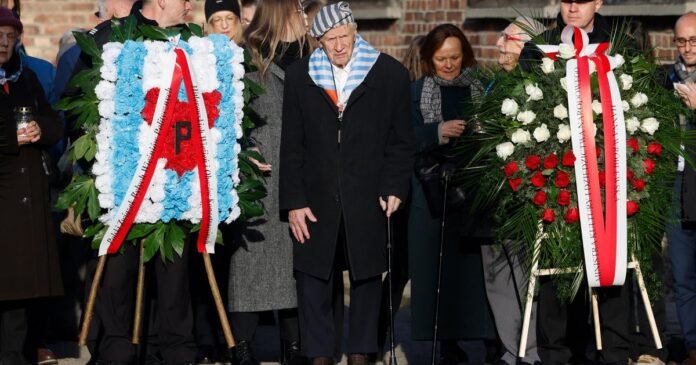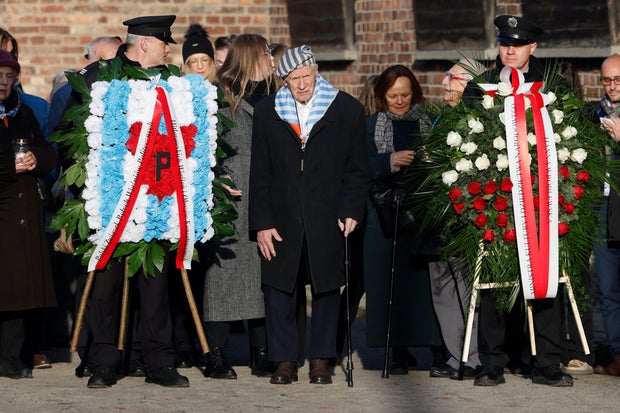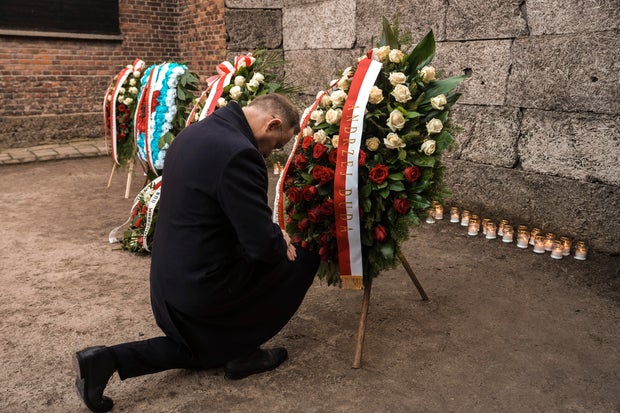Oswiecim, Poland — The 80th anniversary of the liberation of Auschwitz by Soviet troops is being marked on Monday at the site of the former death camp, a ceremony that is widely being treated as the last major observance that any notable number of survivors will be able to attend.
Nazi German forces murdered some 1.1 million people at the site in southern Poland, which was under German occupation during World War II. Most of the victims were Jews killed on an industrial scale in gas chambers, but the Germans also murdered many Poles, Roma, Soviet prisoners of war, gay people and others who were targeted for elimination in the Nazi racial ideology.
Auschwitz quickly became a potent symbol of the horrors of the Holocaust. Its notorious “selection process” for prisoners arriving at the camp’s train platform determined life or death in mere moments. Families were torn apart, with children, the elderly, and the disabled often sent immediately to their deaths. As CBS News reporter Anna Noryskiewicz reported from the memorial on Monday, the vast majority of prisoners who survived the initial selection went on to endure unimaginable suffering and were still eventually murdered, often after grueling forced labor in sub-zero temperatures or cruel medical experiments.
Survivors have described Auschwitz as a hell on Earth — a place where life lost all meaning. Their harrowing testimonies at the memorial service on Monday were to reveal the depths of the cruelty inflicted on so many people, but also the resilience of the human spirit.
WOJTEK RADWANSKI / AFP via Getty Images
Polish President Andrzej Duda, whose nation lost 6 million citizens during the war, placed a candle Monday at Auschwitz’s Death Wall, where many prisoners were executed, among them Poles who resisted the occupation of their country. He was surrounded by elderly survivors of the camp, who were assisted by family members.
In all, the Germans murdered 6 million Jews from all over Europe, annihilating two-thirds of Europe’s Jews and one-third of all Jews worldwide. In 2005, the United Nations designated Jan. 27 as International Holocaust Remembrance Day.
Later in the day, world leaders and royalty will join with elderly camp survivors, the youngest of whom are in their 80s. Politicians, however, have not been asked to speak this year by the event’s organizers. Due to the advanced age of the survivors, organizers have chosen to make them the center of the observances.
Among the leaders expected to attend are Germany’s Chancellor Olaf Scholz and President Frank-Walter Steinmeier. Germany has never sent both of its highest state representatives to the observances before, according to German news agency dpa.
It is a sign of Germany’s continued commitment to take responsibility for the nation’s crimes, even amid a growing far-right movement that would like to forget them.
Oded Balilty / AP
French President Emmanuel Macron and Canadian Prime Minister Justin Trudeau will also attend, while Britain’s King Charles III will also be there along with kings and queens from Spain, Denmark and Norway.
The White House said Washington would be represented by U.S. special Mideast envoy Steve Witkoff and Commerce Secretary nominee Howard Lutnick, among others.
Russian representatives were in the past central guests at the anniversary observances in recognition of the Soviet liberation of the camp on Jan. 27, 1945, and the huge losses suffered by Soviet forces in the Allied defeat of Nazi Germany. But they have not been welcome since Russia’s full-scale invasion of Ukraine in 2022.
Ukrainian President Volodymyr Zelenskyy, who is Jewish, said Monday that the world must unite against evil, Agence France-Presse reports.
“We must overcome the hatred that gives rise to abuse and murder. We must prevent forgetfulness. And it is everyone’s mission to do everything possible to prevent evil from winning,” he said, according to a statement from the presidency.
Read More: Auschwitz survivors the focus of ceremony for 80th anniversary of its liberation on




